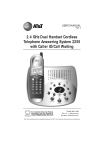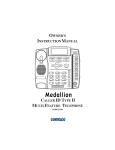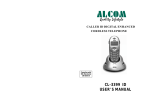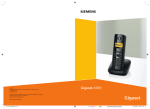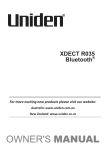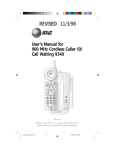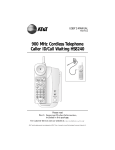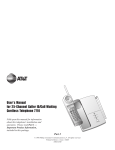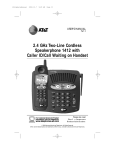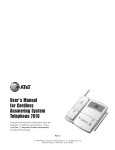Download AT&T 7700 User`s manual
Transcript
O P E R AT I N G This cordless telephone operates at the maximum power allowed by the Federal Communications Commission (FCC). Even so, the handset and base can communicate over only a certain distance — which can vary with the locations of the base and handset, the weather, and the construction of your home or office. R A N G E If you move out of range while on a call, the phone will be left “off the hook.” To hang up properly, walk back into range, periodically pressing P until the PHONE light goes off. Changing Channels If the handset is moved to a point where the base and handset can no longer communicate, the handset will sound two short beeps when you make a call, indicating that you are out of range. Move closer to the base to restore normal operation. This cordless telephone has an advanced AutoSelect feature that minimizes the chance of interference. In the unlikely event that you notice noise or interference while using the handset, 1 Press C. 2 If the interference does not clear, continue to press C until you find a clear channel (your call will not be interrupted) — OR— Move closer to the base and press C. If you receive a call while you are out of range, the handset might not ring — or if it does ring, the call might not connect when you press P. Move closer to the base, then press P to answer the call. If you move out of range during a phone conversation, you will hear noise or interference. To improve reception, move closer to the base. NOTE: You must be in range to change channels. 2 User’s Manual for Cordless Telephone with Caller ID 7700 # Fold open this manual for information about this telephone's installation and operation. Please read Part 1 — Important Product Information, included in this package. Part 2 © 1998 Philips Consumer Communications L.P. All rights reserved. Printed in China. 848233938 Issue 1AT&T I N S TA L L AT I O N AC Adapter Modular Jack PULSE/TONE Switch Telephone Line Cord Power Cord FOR TABLE/DESK INSTALLATION 1 2 3 4 5 6 Choose a spot near an electrical outlet and a telephone jack. This phone requires a modular telephone jack and a standard electrical outlet (110v AC). Install the handset battery. For an illustration of battery installation, see BATTERIES. • Plug the battery pack connector into thehandset and place the battery pack into the case, so the wires rest between the battery pack and the case. • Place the battery case cover on the handset by sliding it on its track up over the battery case until it snaps firmly in place. Install the handset antenna. Screw the antenna into the opening at the top of the handset. Connect the telephone line cord. Plug one end of the telephone line cord into the jack on the back of the base. Plug the other end of the line cord into a modular phone jack. Make sure the plug snaps firmly in place. Connect the power cord. Plug the power cord into the POWER jack on the back of the base. Plug the AC adapter on the power cord into an electrical outlet. Charge the handset batteries for 10 hours before use. Place the handset face up or face down in the base if your phone is installed on a table. Place the handset 7 8 face down in the base if your phone is installed on a wall. (The handset charges only face-down when the base is wall-mounted.) The CHARGING light on the base goes on to show the handset is in the right position to charge the batteries. Check for dial tone. After the batteries are charged, pick up the handset and make sure the base antenna is upright. Check for dial tone by pressing P; the PHONE light should go on and you should hear a dial tone. Set the dial mode. If you have touch tone service, the phone will be ready to use as soon as the battery is charged. NOTE: If you have dial pulse service, you’ll need to set the dial mode. Set the PULSE/TONE switch on the back of the base to PULSE. CAUTION: Use only the AC power adapter supplied with this telephone. Power Supply 4000T. Input: AC 120v, 600 Hz, 4.7W Output: 120 VDC, 200 mA. 1 I N S TA L L AT I O N Power cord Push in on the two tabs at the large end of the triangular mounting bracket. Turn the mounting bracket so the double slot is at the bottom. Wrap any excess line cord around the 4 tabs on the underside of the phone base. Feed the free end of the line cord through the rectangular opening in the center of the bracket. 6 Channel on base Guide the power cord from the jack through the channel on the base. Slide the base down onto the knobs until it locks in place. Guide the power cord from the jack through the channel on the base, as shown in the illustration above. 7 Turn the mounting bracket so the double slot is at the bottom. Feed the free end of the line cord through the rectangular opening in the center of the bracket. 8 Connect the line cord to the wall jack. Make sure it snaps firmly in place. 9 Mount the base on the wall. Hold the base so the mounting knobs on the wall plate fit the keyhole slots on the base. Slide the base down onto the knobs until it locks in place. 10 Plug the AC adapter on the power cord into an electrical outlet. 11 Follow Steps 6, 7, and 8 in FOR TABLE/DESK INSTALLATION. FOR WALL INSTALLATION The wall mounting bracket is a wedged, triangular plastic piece attached to the bottom of the base. You'll need to attach this piece so the thickest end of the bracket is facing the floor when you wall-mount the base. 1 Remove the mounting bracket. Push in on the two tabs at the large end of the triangular mounting bracket. (The tabs are marked "PULL TAB TO RELEASE.") Lift the bracket off the unit. 2 Follow Steps 1, 2, and 3 in FOR TABLE/DESK INSTALLATION. 3 Reverse the handset tab. Pull the tab on the base up and away from the base. Turn the tab around, and slide it back into the opening. The notch should be facing up to hold the handset when you place it in the base. 4 Connect the telephone line cord. Plug one end of the line cord into the jack on the base. Guide the cord from the jack through the curved channel on the bottom of the base. Wrap any excess line cord around the 4 tabs on the underside of the phone base. (Make sure you leave enough cord free to extend to the wall jack.) 5 Connect the power cord to the base. Plug the power cord into the jack labeled DC12V on the back of the base. 2 O P E R A T I O N Making a Call 1 2 Temporary Tone Press P, and wait for the PHONE light to go on steadily. When you hear a dial tone, dial the number. (For information about the Display Dial feature, see the CALLER ID section of this manual). NOTE: If you have touch tone service, you don’t need to use the Temporary Tone feature. If you have dial pulse (rotary) service, this feature allows you to enter codes or tones needed to operate answering machines, or use electronic banking services, calling cards, and other special services. This feature will operate most special services; however, some services may actually require a touch tone line. To be sure, ask the company that provides the special service. 1 Dial the call, then press *. Any buttons pressed after this send tone signals. 2 After you hang up, the phone automatically returns to dial pulse (rotary) dialing. Answering a Call Press P. The PHONE light goes on, and the call is connected. Ending a Call To end a call, place the handset into the base or press P. Redial Page The last number dialed (up to 24 digits) on this phone is stored in redial memory until you dial another number. 1 Press P, and wait for the PHONE light to go on. 2 When you hear a dial tone, press R. The Page feature allows you to signal someone at the handset from the base. • Make sure the Handset In Use light is not lit on the base. • Press the PAGE/HANDSET LOCATOR button on the base. A 3-part paging tone will sound at the handset. Handset Ringer/Battery Saver Feature NOTE: The handset ringer switch must be set to ON to operate the Page and Handset Locator features. Set the handset RINGER. 1 Press m, -, -, - or press m, +. 2 Use < or > to scroll through Ringer PAT (pattern) choices (Ringer PAT 1, 2, 3, or Ringer Off). 3 Press - when the screen displays your selection, and you hear the desired ringer pattern. Handset Locator To locate the handset using this feature: Press and hold the PAGE/HANDSET LOCATOR button on the base for approximately four seconds. A repeating paging tone is sounded in the handset. To cancel the Handset Locator feature: Press P or I or d on the handset or the PAGE/ HANDSET LOCATOR button on the base. When the ringer is OFF, the handset stays ready to use for up to 21 days in standby mode before you have to return it to the base for recharging. You can still use the handset to make a call or to answer a call if you hear an extension phone ringing. NOTE: This feature will turn itself off in approximately 3 minutes if you haven’t turned it off by then. When the ringer is ON, the handset stays ready to use for up to 7 days. Hold Press H to put a call on Hold. The screen displays Phone Hold. To return to the call, press H, or lift an extension phone on the same line. NOTE: If you set the RINGER to OFF, the handset battery will last longer. However, when the ringer is OFF, no Caller ID information appears on the screen as it is coming in (but it is stored in call history), and the handset does not ring. Mute Mute allows you to hear your caller, but prevents the caller from hearing you. While on a call: Press M. The screen flashes MUTE. To continue your conversation: Press M again. Handset Volume The handset volume can be set to three different levels. Each time you press V the level changes. 3 O P E R A T I O N Flash Timer Press F to activate custom-calling services such as Call Waiting or 3-Way Calling. You may have to press other buttons before or after F as explained in custom-calling instructions provided by your local telephone service company. The screen displays the elapsed time of the call in hours, minutes and seconds (up to 9 hours, 59 minutes, 59 seconds). The timer appears on the screen fifteen seconds after the last digit is dialed, and remains on the screen for the duration of the call. Display screen Scroll through call history and menu options Access call history Dial number displayed on screen PHONE light goes on when phone is in use Delete information from call history Make, answer and end calls Adjust handset volume Access telephone subscriber services Redial last number called Change channels Mute a call # Move right Move left Access/change special features HANDSET IN USE Light CHARGING Light is on when handset battery is charging PAGE/HANDSET LOCATOR Button Store and access numbers in telephone memory Temporary Tone NEW CALL Light is on when you have unreviewed call information Put caller on Hold 4 T E L E P H O N E This cordless phone can store 20 telephone numbers and names that you dial just by pressing p and two of the number buttons. The telephone memory works with the Memory Match and Priority Ring features. When you receive a call from a number you’ve stored in memory, the screen displays the name information as you’ve stored it, not as the service sends it (for example, you can store "Mom"). Additionally, the phone can alert you to calls from numbers you’ve stored in memory, with a special Priority Ring, and with a VIP display on the screen. M E M O RY 5 6 7 To enter subsequent letters from the same key (for example, e and f), use > to move the cursor to the next space. Press and release p. Press the number buttons (01 to 20) for the memory location where the name/number is to be stored. A four-part tone confirms that the number was stored properly. If you hear a long buzzing tone, or nothing at all, press P, then follow the steps above to store the number again. Storing Numbers in Memory 1 2 Make sure the handset is off. Press p. 3 Enter the phone number (up to 24 digits). 4 5 Press p. Press any number buttons from 01 to 20 for the memory location where the number is to be stored. Storing Call Records in Memory You can transfer information from the Caller ID history into the telephone memory. 1 Press and release I. 2 Use + or - to locate the call record you want. 3 Press and release p. 4 Press and release p. 5 Press the number buttons for the memory location where you want to store the call record. Viewing Numbers in Memory 1 2 3 4 6 A four-part tone confirms that the number was stored properly. If you hear a long buzzing tone, or nothing at all, press P, then follow the steps above to store the number again. Dialing Memory Numbers 1 2 3 4 For example, to store 555-1212 in memory location 9, press p, 5, 5, 5, 1, 2, 1, 2, p, 0, 9. Press P. Press p. Press the number buttons for your memory location. Press d. For example, to dial the number stored in location 9, press P, p, 0, 9, d. To check a number before dialing, see "Viewing Numbers in Memory" above. NOTE: The handset exits programming mode if you don't press a button within 30 seconds, or if you press P. Storing Names with Numbers 1 2 3 4 Press p. Press m. Press + or - to scroll through memory — OR — Enter the 2-digit memory location (01-20). Press D to dial the number displayed on the screen. Press and release p. Use the keypad to enter the telephone number. Press and release m. Use the keypad to enter letters. Press once for the first letter on the button. Press twice for the second letter on the button. Press three times for the third letter on the button. Press L to back up if you make a mistake, or use < or > to move to a letter and type over it. Storing a Number Just Dialed Whenever you make a telephone call, you can store the number you dialed in memory. Press R instead of entering the telephone number when “Storing Numbers in Memory.” Replacing a Stored Number/Name You can replace a stored number/name by storing a new number/name in its place. 5 T E L E P H O N E Storing a Pause in a Memory Dial Number M E M O R Y Reviewing Memory Numbers When storing a number in memory, press and hold down the number button that comes before the pause, until you hear the second beep. This inserts a 2-second pause after that digit. If you hold the number button down longer, you will hear more beeps as additional pauses are stored. 1 2 3 NOTE: Each pause you store is counted as a digit. You can store up to 24 digits in each memory location. Press p. Press m. Press + or - to scroll through memory locations and view numbers (press > to view a name after a displayed number, if stored) — OR — Enter a location number (01-20) to review. For example, to store 9, PAUSE, 555-1212 in memory location 9: Press p, 9 (hold the 9 for 2 seconds until a second beep is heard), then press 5, 5, 5, 1, 2, 1, 2, p, 0, 9. Priority Ring If you’ve stored a number in memory and marked it as a VIP caller, when a call comes in from that number, the phone rings in a special way to alert you to this special call. Follow the directions below to mark a memory location as a VIP caller. 1 Press p. 2 Press m. 3 Press + or - to scroll through locations — OR — Enter the memory location number (01 - 20). 4 Press m. The screen displays the VIP icon. (To remove VIP status, press m again.) Deleting Memory Numbers and Names You can delete the information in a single memory location or in all memory locations. 1 Press p. 2 Press m. 3 Press + or - to scroll to the desired memory location. 4 Press L. The screen displays CLEAR? 5 Press L to delete the memory information. To delete all memory location information. 5 1 2 3 Press p to store VIP status. 6 Press p. Press m. Press + or - to scroll to TOP OF LIST, then follow Steps 4 and 5 above. C A L L E R I D O P E R AT I O N Caller's name Caller's telephone number Voice mail message waiting (with paid service of telephone company voice mail) Battery status indicator New call information in call history since you last reviewed This telephone number has been stored as a VIP Select Display Screen Language About Caller Identification 1 This telephone is designed to store and display information about incoming telephone calls. It must be used with caller identification service provided by your local telephone company; there is a fee for this service, and it may not be available in all areas. Additionally, this telephone can be used with call waiting and voice mail, also paid subscriber services. This telephone can provide information only if both you and the caller are in areas offering caller identification service, and if both telephone companies use compatible equipment. 2 3 Press and release m. The screen displays the currently selected language. Use < or > to scroll through language selections: English, Spanish, or French. Press m when the screen displays your selection. Adjust Display Contrast 1 2 The system keeps a record of the last 99 calls, whether you answer the phone or not. The oldest call is numbered 1. When the call history becomes full, the system drops the oldest call to make room for a new call. If you subscribe to Caller ID with Call Waiting, you can see who’s trying to reach you when you’re on another call. The time and date are sent by your service provider, and are recorded in the call history. 3 Press m, -. The screen displays the current contrast setting. Use < or > to scroll through settings: Contrast 1, 2, 3, or 4. The screen displays each selected setting. Press m when the screen displays your selection. In order to receive name and number Caller ID information, you must subscribe to name and number Caller ID service. Caller ID information appears in the display after the first ring of the incoming call. Customized Features Caller ID Display Messages You can customize some features of the Caller ID system. Follow the directions below to select English, French, or Spanish for the display language, adjust the contrast setting for the display, and program the system to recognize your home area code and up to two other local area codes. PRIVATE The name or phone number is “blocked” at the caller’s request. UNKNOWN Appears for some long-distance calls or calls originating in an area — OR — not offering Caller ID service. OUT OF AREA NO DATA Some information may be missing or incorrect because of SENT interference on the line. 7 C A L L E R I D O P E R AT I O N Program Area Codes Reviewing Call History You must program the system to recognize your home area code in order to use the Display Dial feature described later in this section. The screen displays call information for about 15 seconds after it has been received. 1 Press I. The screen displays the number of new calls, or No New CID and the total number of calls in the call log. 2 To review earlier calls, press -. 3 Press > to view time and date of call. After programming your home area code, the screen displays the 7 digits of the number (without the area code) when you receive a call from this area code. When you use the Display Dial feature, the unit dials the 7 digits without inserting a "1" or an area code. > You can also program up to two other local area codes. These are area codes that do not require dialing a “1” before them. After programming, if you receive a call from one of these area codes, the screen displays the ten digits (3 digits of area code plus 7 digits of phone number). When you use Display Dial, the unit dials ten digits, without inserting a “1” before the the area code. 1 Press m, -, -. The screen displays the current area codes, if there are any. 2 4 To advance through call history from an earlier call, press +. The screen displays TOTAL=XX to indicate you have reviewed all the calls in the call history. Removing Call Records from History 1 2 3 Press I. Use + or - to reach the call record you want to remove. Press L. The screen displays Clear?. 4 Press L again to erase the displayed call record. Use the keypad to enter your home area code, then up to two other local area codes (if applicable). You can skip entering an area code by pressing < or >. To Remove All Call Records 3 1 When you’ve finished programming area code(s), press m. 2 3 Call Waiting When you subscribe to Call Waiting and receive a call while using the 7700, the screen briefly displays Call Waiting, then indicates the name and number of the caller. Press F to access the call. Press F again to return to the original call. Follow Steps 1 and 2 above until the screen displays Total and the number of calls. Press L. The screen displays Clear?. Press L again to remove all call records. Display Dial As you review calls in history, you can dial a displayed phone number by pressing d. Make sure to program your local area code(s) as described in "Program Area Codes." Message Waiting and New Call Light This light stays on when you have received call information but have not yet reviewed it. If you subscribe to a voice mail service, this light flashes if you have unretrieved messages waiting. 8 B AT T E R I E S CAUTION: To reduce the risk of fire or injury to persons or damage to the telephone, read and follow these instructions carefully. • Use only Replacement Battery 4051. • Do not dispose of the battery in a fire. The cell might explode. Check with local codes for special disposal instructions. • Do not open or mutilate the battery. Released electrolyte is corrosive and may cause damage to the eyes or skin. It may be toxic if swallowed. • Exercise care in handling batteries in order not to short the battery with conducting materials such as rings, bracelets, and keys. The battery or conductor may overheat and cause harm. • Charge the battery provided with or identified for use with this product only in accordance with the instructions and limitations specified in this manual. • Observe proper polarity orientation betweenthe battery and battery charger. Charging the Handset Battery Pack The batteries need charging when: • The phone beeps four times when you press P. • The battery icon is empty on the handset screen. • The phone does not respond when you pressP, and no lights go on. Place the handset face up or face down in the base so the CHARGING light goes on. (If you have wall-mounted the base, place the handset face down). The batteries will be fully charged in 10 hours. A fully charged battery maintains standby power for up to 7 days when the handset ringer is ON, and up to 21 days when the ringer is OFF. If it’s more convenient for you, you can leave the handset in the base all the time. It is impossible to overcharge the battery. If you get a low battery indicator even after 10 hours of charging, the battery should be replaced. Replacing the Handset Battery Pack 1 2 3 4 5 Replacing the Handset Battery Pack 9 Remove the battery case cover on the handset by pressing on the indentations and sliding the cover downward. Lift out the old battery pack and unplug it from the handset. Hold the new battery pack and plug the connector into the handset. Place the battery pack into the case, so the wires rest above the battery pack. Replace the cover by sliding it on its track up over the battery case until it snaps firmly into place. The new batteries must be charged before using the phone. Place the handset face down or face up in the base (face down only if wall mounted) and allow it to charge for 10 hours. The telephone might operate before that, but for best performance, let the handset batteries charge fully. IN CASE OF DIFFICULTY If you have no dial tone If you have difficulty operating this phone, try the suggestions below. If you still have trouble, call 1 800 722-9125. Check all the previous suggestions. If you still do not hear a dial tone, disconnect the phone and try another phone in the same jack. If there is no dial tone on that phone either, the problem is probably in your wiring or local service. Call your local telephone service company. If the phone does not work at all, check these items first • • • • • • Make sure the power cord is plugged into the base and an electrical outlet. Make sure the telephone line cord is plugged firmly into the base unit and the telephone jack. If the phone does not beep, or beeps four times when you press P, the batteries might need recharging. Make sure the battery pack is installed correctly. If the battery pack still will not charge, replace it with Replacement Battery 4051. If the above suggestions do not solve the problem, try resetting the security code (see next section). If you hear noise or interference • • • • If you hear a two-beep signal when you try to use the handset • • You may be out of range. Move closer to the base. Press and release C to change to another of the 25 channels available. If the noise is exceptionally loud, move closer to the base before changing channels. Household appliances plugged into the same circuit as the base can sometimes cause interference. Try moving the appliance or the base to another outlet. The layout of your home or office might be limiting the operating range. Try moving the base to another location, preferably on an upper floor. If the phone does not ring when you receive a call The handset and base are not communicating properly. You might be out of range while attempting to dial. Move closer to the base and try the call again. If moving closer to the base does not help, the handset and base might be set to different security codes. To reset the security code, try the following: • Place the handset in the base, and check to make sure the CHARGING light is on. Wait 15 seconds, then pick up the handset and press P. The phone should operate properly. If it does not, try the next step. • Place the handset in the base, and check to make sure the CHARGING light is on. Unplug the AC adapter from the outlet, wait 15 seconds, then plug it in again. The CHARGING light should go on. Wait another 15 seconds, then pick up the handset and press P. The phone should operate properly. If it does not, try the next step. • Pick up the handset, open the battery compartment, and unplug the battery pack. Wait 15 seconds, then reinstall the battery pack, close the battery compartment, place the handset in the base, and check to make sure the CHARGING light is on. Wait another 15 seconds, then pick up the handset and press P. The phone should operate properly. • • • • • Make sure the handset ringer is set to ON. Make sure the telephone line cord is connected firmly to the base and the telephone jack. Make sure the power cord is plugged into an outlet not controlled by a wall switch. You might be too far from the base. Move closer to the base. You might have too many extension phones on your telephone line to allow all of them to ring. Try unplugging some of the other phones. Press C to change to another channel. If you hear other calls • • Press C to change to another channel. Disconnect the base from the telephone jack and plug in a corded telephone. If you still hear other calls, the problem is probably in your wiring or local service. Call your local telephone company. If your telephone misdials or you don’t hear the other person right away • If you hear noise in the handset and the buttons don’t work • The base unit and handset might not be set to the same security code. Place the handset in the base for at least 15 seconds to reset the security code. • 10 It might take a few seconds for your handset to find a good connection to the phone system. While it is searching, the PHONE light blinks rapidly. Do not start dialing until the PHONE light is on steadily. If you have dial pulse (rotary) service, set the TONE/ PULSE switch on the back of the base to PULSE. If you have tone service and you hear strange clicks while you are dialing, set the TONE/PULSE switch on the back of the base to TONE. IN CASE OF DIFFICULTY The caller's name or phone number is not displayed • • • The caller's name or phone number is not displayed during Call Waiting Make sure you subscribe to Caller ID service or Caller ID Name and Number service from your local telephone company. Caller ID service might not work when the phone is connected to a Private Branch Exchange (PBX). Caller ID service is inactive during a power interruption. • • Make sure you subscribe to the combined Caller ID service with Call Waiting. The screen will not display the call information if someone is on an extension phone. Display Dial feature does not work • • 11 Check to make sure you have stored your area code correctly. This feature might not work if the phone is connected to a Private Branch Exchange (PBX).












